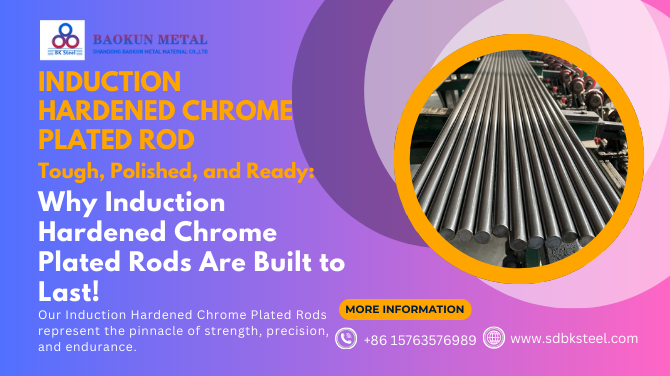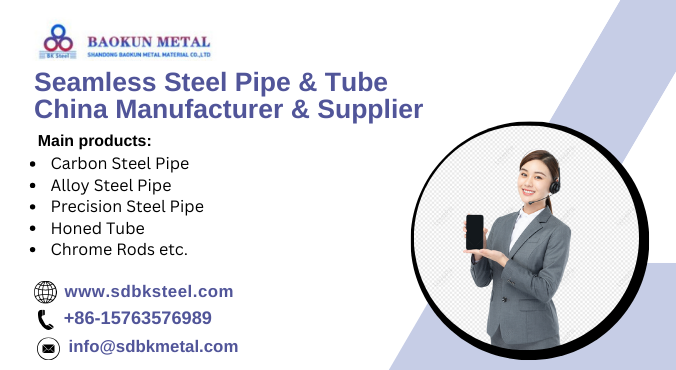
In today’s world of high-performance machinery and demanding industrial applications, durability and strength are no longer optional—they’re essential. Whether you’re manufacturing hydraulic cylinders, building robust mechanical systems, or crafting precision-driven components, your materials must withstand immense stress, resist corrosion, and perform flawlessly under pressure. That’s where the Induction Hardened Chrome Plated Rod comes into play.
At Shandong Baokun Metal Material Co., Ltd, we understand that engineering excellence begins with the right materials. Our Induction Hardened Chrome Plated Rods represent the pinnacle of strength, precision, and endurance. Built for the harshest environments and designed to outperform, these rods are meticulously manufactured to deliver consistent results and long-lasting reliability.
What is an Induction Hardened Chrome Plated Rod?
Let’s start by breaking down this powerhouse of a component. An Induction Hardened Chrome Plated Rod is essentially a precision-engineered steel rod that undergoes two major enhancements—induction hardening and chrome plating. These treatments turn an ordinary rod into a high-performance mechanical element capable of resisting wear, corrosion, and stress over long operational cycles.
Induction Hardening: A Deep Dive
Induction hardening is a heat treatment process where the rod is subjected to a rapidly alternating magnetic field. This causes the outer layer of the steel to heat up quickly, which is then rapidly cooled (quenched). The result? A super-hard surface while maintaining a tough and flexible core.
Chrome Plating: Why It Matters
After the rod is hardened, a layer of chrome is electroplated onto the surface. This not only gives the rod its polished, mirror-like finish but also adds corrosion resistance, reduces friction, and improves the wear life of the component.
The Manufacturing Process
At Shandong Baokun Metal Material Co., Ltd, the production of Induction Hardened Chrome Plated Rods follows a meticulous, step-by-step procedure to ensure performance and consistency.
1. Material Selection
High-carbon steel or alloy steel is selected for its strength, machinability, and ability to respond well to hardening.
2. Induction Hardening
The rod is heated using induction coils, focusing heat just below the surface. Once the optimal temperature is reached, it’s immediately quenched.
3. Chrome Plating
The hardened rod is then immersed in a chrome bath and electroplated to a precise thickness—typically 20 to 30 microns.
4. Quality Inspection
Every rod undergoes rigorous inspection for hardness, straightness, chrome thickness, surface roughness, and other critical parameters.
Core Features of Induction Hardened Chrome Plated Rods
- Surface Hardness
Thanks to the induction process, surface hardness can reach HRC 55-65, making it resistant to denting and scratching. - Corrosion Resistance
The chrome plating acts like a shield against moisture, chemicals, and other corrosive agents. - Dimensional Accuracy
These rods are precision-ground, maintaining extremely tight tolerances and straightness. - Fatigue Resistance
The combination of a hardened exterior and a ductile core gives excellent fatigue strength under cyclic loads.
Why Induction-Hardened Chrome-Plated Rods Outperform Traditional Rods?
- Strength and Toughness
Unlike untreated rods, these rods offer superior tensile strength and can handle heavy loads without deforming. - Longer Service Life
Their robust construction means fewer replacements, less downtime, and better performance over the long haul. - Smoother Surface Finish
With a surface roughness as low as Ra 0.2 μm, these rods minimize wear on seals and provide smoother movement in hydraulic systems.
Applications in Real-World Industries
- Hydraulic Cylinders
These rods are the go-to choice for piston rods due to their high surface hardness and corrosion resistance. - Construction Equipment
From backhoes to bulldozers, they ensure smooth and powerful actuation of moving parts. - Automation & Robotics
Precision motion is critical here, and these rods deliver just that. - Agricultural Machinery
Resistant to mud, rain, and temperature extremes, these rods thrive in agricultural environments.
Technical Specifications to Look For
- Diameter: Ranges from 6mm to 200mm
- Length: Custom cut to spec (up to 8 meters)
- Chrome Thickness: 20–30 microns
- Surface Roughness: Ra ≤ 0.2μm
- Case Depth: Typically 0.5–2.5mm
How to Choose the Right Rod for Your Needs?
- Load Requirements: Heavy machinery needs higher strength rods.
- Environment: Consider corrosion resistance if used outdoors or in chemicals.
- Seal Compatibility: Ensure surface finish matches seal type to prevent leaks.
Shandong Baokun Metal Material Co., Ltd’s Engineering Excellence
With decades of industry experience and a commitment to innovation, Shandong Baokun stands out by:
- Using advanced CNC machining and plating tech
- Implementing strict quality control
- Serving clients in over 50 countries
Sustainability and Environmental Impact
Using induction heating instead of traditional flame hardening greatly reduces energy consumption. Plus, environmentally friendly chrome plating solutions ensure compliance with international standards.
Cost vs. Value
Yes, induction hardened rods are more expensive than untreated ones—but the ROI is unbeatable. Fewer breakdowns, less maintenance, and longer life make them the more economical choice in the long run.
In high-performance industrial settings, there’s no room for compromise. Induction Hardened Chrome Plated Rods from Shandong Baokun Metal Material Co., Ltd offer the ideal blend of strength, precision, and durability. Engineered to excel in the most demanding conditions, these rods are truly tough, polished, and ready for whatever challenge you throw their way.
FAQs
1. What is the main advantage of induction-hardened rods?
They offer higher surface hardness and wear resistance without compromising the core’s toughness.
2. How thick is the chrome plating?
Typically between 20–30 microns, optimized for both corrosion protection and smooth operation.
3. Can these rods be used in marine environments?
Yes, the chrome plating makes them resistant to salt and moisture, ideal for marine and offshore use.
4. Do they come in custom lengths and diameters?
Absolutely! Shandong Baokun offers tailored solutions to match exact engineering requirements.
5. How does Shandong Baokun ensure quality?
Every rod undergoes thorough inspection using laser gauges, hardness testers, and roughness meters.
